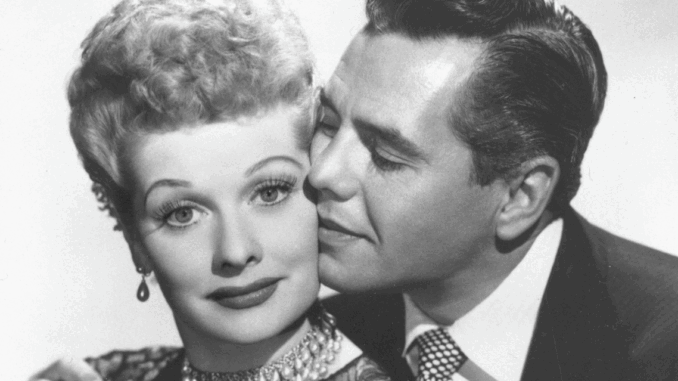
When fans think of I Love Lucy, the spotlight usually shines on Lucille Ball’s brilliant slapstick or Vivian Vance’s perfectly timed zingers. But one of the show’s most quietly transformative forces wasn’t just one of the actors—it was the man who made the show’s very existence possible: Desi Arnaz.
While his portrayal of Ricky Ricardo—charismatic bandleader, exasperated husband, and loving father—is remembered fondly, Desi Arnaz’s real genius happened behind the scenes. Without him, I Love Lucy wouldn’t have been the cultural landmark it is today. And television itself? It might have taken decades longer to evolve.
A Cuban Immigrant Who Changed Hollywood
Born in Santiago de Cuba, Desi Arnaz came to the United States after his family fled political unrest. What followed was a journey unlike anything else on 1950s television: a Latino immigrant not only starring in a top-rated sitcom, but producing it, financing it, and completely rewriting the rules of how TV was made.
That alone is extraordinary. But Arnaz didn’t stop at breaking barriers. He built the television industry’s modern foundation—from technical production to syndication to how sitcoms are still shot today.
Inventing the Three-Camera Sitcom
Before I Love Lucy, sitcoms were mostly broadcast live, which meant lower quality and no way to save episodes for future viewing. Arnaz, working with legendary cinematographer Karl Freund, insisted on shooting I Love Lucy on 35mm film using three cameras. That setup allowed editors to cut between multiple angles without reshooting scenes or losing spontaneity.
It was expensive. CBS didn’t want to do it. So Desi struck a deal: he and Lucy would cover the extra costs in exchange for ownership of the episodes. CBS agreed, assuming the rights were worthless.
That deal would go on to become one of the smartest business moves in Hollywood history.
He Created Reruns—Literally
Because I Love Lucy was filmed and not broadcast live, the episodes could be aired again. This gave birth to reruns—a concept Desi Arnaz essentially invented.
When Lucy gave birth to her son Desi Jr. and needed time off, Arnaz came up with the idea to re-air past episodes, which filled the schedule and kept the show on top of the ratings. In the process, he created television syndication—a multi-billion-dollar industry today.
Every time you see a classic show airing on cable, streaming, or digital networks, you’re watching a ripple effect of Desi Arnaz’s brilliance.
Lucille Ball Was the Star, But Desi Made Her Shine

While Lucy’s talent was undeniable, she was the first to credit Desi’s business and technical genius. She trusted him with the show’s pacing, budgeting, directing, and structure.
Arnaz was the first to hire a full-time laugh track engineer, the first to build a dedicated soundstage for a sitcom, and the first to create a production company (Desilu) that would later produce Star Trek, The Untouchables, and Mission: Impossible.
But what made his collaboration with Ball so legendary was the balance. While she handled the performance and character development, he oversaw the logistics and ensured their wild ideas were actually possible.
Their real-life marriage had challenges—but their creative partnership remains one of the most successful in entertainment history.
Why Ricky Ricardo Was Revolutionary
It’s easy to overlook Ricky Ricardo now, but think about it: in the 1950s, a Latino man with a Cuban accent was not only a lead character on American TV—he was portrayed as smart, hardworking, romantic, and morally grounded. That was unheard of.
And Desi wasn’t playing a stereotype. He was playing a version of himself—an immigrant who built success from nothing, who loved jazz and mambo, who spoke two languages and lived between two cultures.
He brought that authenticity to the screen unapologetically. He wasn’t comic relief. He was the anchor of the show’s family. He grounded Lucy’s hijinks with charm, passion, and reality. Their chemistry felt real because it was real.
And every kid growing up with I Love Lucy saw a household where different cultures blended, clashed, and found humor in the middle. That mattered.
Desi’s Legacy: Quiet But Colossal
Desi Arnaz never got the same credit as other television titans of the era. Maybe it was because he was working behind the scenes. Maybe it was racism. Maybe it was because he never sought the spotlight as a solo act.
But the evidence is everywhere. Every sitcom that films in front of a live audience, every rerun you see, every production company that sells shows into syndication—those innovations began with Desi.
He once said, “I loved Lucy, and she loved me.” That much is clear. But Desi also loved television, and he gave everything to it.
Without him, Lucy would have been a star. But with him, she became a phenomenon. And I Love Lucy became the most important sitcom in history—not just because it made us laugh, but because it changed everything behind the camera too.